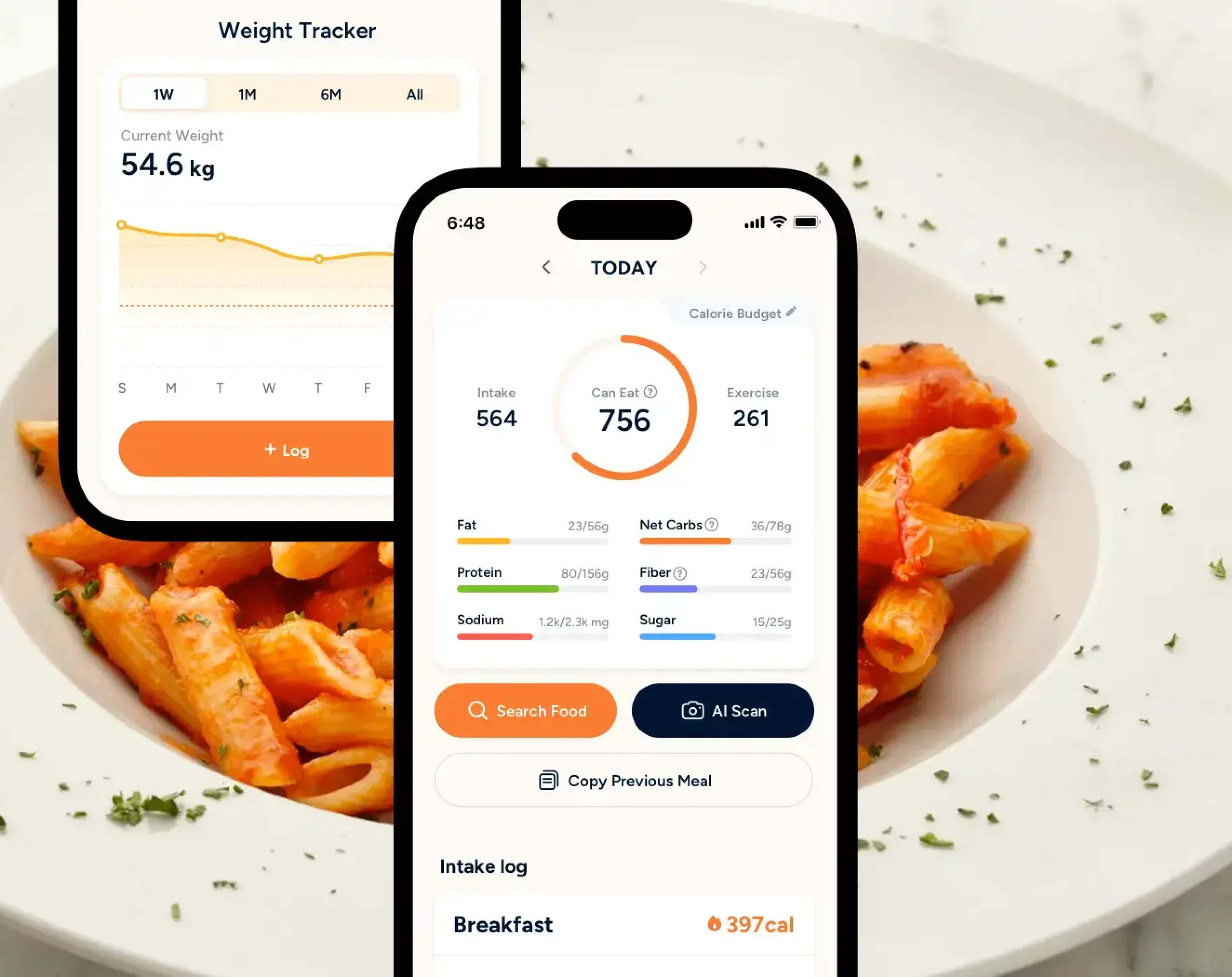Imagine just having all your day’s worth of calories in one meal. No breakfast, no lunch, just dinner. Some may see this as an easy way to cut calories and lose the excess weight, but for others, this may seem like an impossible attempt. Despite its restrictive nature, unlike other forms of intermittent fasting, it has been gaining popularity in mainstream media for its potential health benefits.
However, just like every fad diet, it accompanies plenty of criticism and concern over both the safety and the efficacy of the diet. We’ll cover the OMAD diet and unpack the potential benefits and risks of this controversial diet.
Key Takeaways
- OMAD is an extreme form of intermittent fasting.
- The diet involves eating only one meal per day with a fasting window of 22–23 hours, aiming to create a calorie deficit for rapid weight loss.
- OMAD may help reduce body fat, improve metabolic markers like BMI, LDL cholesterol, and blood pressure, trigger autophagy, and possibly lower the risk of age-related neurodegenerative diseases.
- Consuming all daily calories in one meal makes it difficult to meet macronutrient and micronutrient requirements, increasing the risk of deficiencies, fatigue, and weakened immunity.
- OMAD can cause intense hunger, dizziness, low blood sugar, headaches, nausea, and may encourage disordered eating patterns due to its restrictive nature.
What is the OMAD Diet?

The OMAD diet, is known as the “One Meal a Day” diet. It is an intermittent fasting method whereby you eat only once a day and fast for the rest of the day.
This strict approach is sometimes used by individuals who are looking to lose weight quickly in a short amount of time.
How does the OMAD Diet work?
The OMAD diet works by eating just one meal and going on a fast for the remainder of the day. It may look like having a 1 to 2 hour eating window. During which you are allowed to eat anything that you want, to keep you full for the entire day.
The fasting periods may typically last 22 to 23 hours. You are supposed to limit your food intake completely, except for beverages. The beverages consumed must be free from calories, such as water, black coffee, or unsweetened tea, to keep you hydrated and curb hunger.
The idea of this diet is to create a calorie deficit so that it leads to weight loss.
However, such prolonged fasting is considered to be an extreme intermittent fasting method. This is as you are not only restricted to a particular eating window, but it also involves reducing your calorie intake quite drastically.
Foods to Eat and Avoid
There are many differing opinions on what you should or should not eat while on the OMAD diet. Some suggest that you should be eating nutrient-rich foods, but some also suggest that you can eat anything that you want within the short eating window.
In our opinion, you should try to prioritize nutrient-dense foods that provide a good amount of protein, healthy fats, fiber, and essential vitamins and minerals. You can only consume all your daily calorie needs in a single meal. Consume foods like lean meats, fish, fruits, vegetables, nuts, and seeds.
It can also help to prevent feeling hungry too soon and potential nutrient deficiencies.
Possible Benefits of OMAD
At present, evidence supporting the health benefits of eating only one meal a day is still limited. However, some researches recommend that the OMAD diet can help with losing weight. Plus, protection against age-related disorders and other chronic illnesses.
Here’s a more in-depth look at some possible health benefits:
a) Aids weight loss

A 2022 meta-analysis found that intermittent fasting is generally comparable to caloric restriction in terms of being able to promote weight loss. However, this health benefit still needs to be studied in longer-term clinical trials [1].
Another study that looked at the effects of reducing meal frequency to once a day in the evening, helped to lower total body fat mass and increase fat oxidation during exercise without physical performance or strength being impacted [2].

Weight Loss Has Never Been Easier
Get accurate nutrition info instantly. Keep track of your progress.
Download Eato For Freeb) Improves metabolic health
Improvement in metabolic health is regularly cited when it comes to discussing the positive effects of intermittent fasting. Research from a 2024 systematic review and meta-analysis found that intermittent fasting had led to significant improvements in various metabolic markers among individuals with metabolic syndrome. It includes a reduction in body weight, BMI, LDL cholesterol, and blood pressure levels [3], promoting fat to ketone metabolism.
c) Triggers autophagy

Autophagy is a process that happens cellularly, in which the damaged cells in your body are broken down and recycled. In order to activate autophagy-related genes, intermittent fasting has been observed in a long-term study of mice to be able to activate said genes, in the body at different areas of tissue [4].
d) Lowers the risk of age-related neurodegenerative diseases
Similarly, recent research suggests that intermittent fasting may also offer neuroprotective benefits that could lower the risk of age-related cognitive decline.
A 2022 review found that fasting enhances mitochondrial function, reduces oxidative stress, and activates cellular stress-response pathways. Preliminary research also suggests that fasting can reduce the accumulation of amyloid and tau proteins, which play a role in the development of Alzheimer’s disease [6]. All of these contribute to slowed brain aging [5].
While the results are not certain yet, these early findings point to the possibility that diets like OMAD may be able to help protect against brain degeneration over time.
Is the OMAD Diet Healthy?
Although most people reportedly do not experience any serious complications from eating one meal a day, besides the discomfort from hunger, it is not considered a healthy long-term diet approach to follow.
It can lead to nutritional deficiencies and increase the risk of binge-eating disorders. Additionally, some studies suggest that OMAD can increase blood pressure and cholesterol levels or even cause insulin resistance. All of which are highly risky for people with existing cardiovascular disease or diabetes.
The next section will further cover the downsides of doing the OMAD diet.
What Are The Downsides of The OMAD Diet?
a) Disordered eating habits

OMAD’s restrictive nature can foster unhealthy relationships with food, especially for those who have a past history of disordered eating. Long periods of fasting followed by eating a single meal in a short period of time may mimic binge-and-restrict patterns, which encourage disordered eating behaviors and an obsession with calorie counting.

Smarter Nutrition Tracking
Track calories and over 100 other nutrients all in one place.
Download Eato For Freeb) Physical side effects

When going through something as drastic as OMAD, it is natural to experience some common side effects that may present as intense hunger, fatigue, dizziness, headaches, low blood sugar, difficulty concentrating, nausea, and indigestion [7].
c) Difficult to sustain
OMAD’s highly restrictive structure can make it hard for many people to maintain over time. High dropout rates of up to 65%, highlight the difficulty of sticking to such an extreme eating schedule [8]. Socially, it may conflict with typical meal patterns that most people follow, making it difficult for a person on the OMAD diet to participate in social gatherings where food takes the center stage.
d) Potential nutrient deficiencies
Participating in OMAD makes it difficult for most people to meet the nutritional needs of their body within a single meal. Essential macronutrients and micronutrients might be excluded from the meal, which, over time, can lead to the participant feeling fatigued, weakened immune function, bone health issues like osteoporosis, and in extreme cases, even malnutrition.
Who should avoid OMAD?
Intermittent fasting methods can be a huge risk for people with existing health conditions such as diabetes or heart disease, and for those who take specific medications that need to be taken with food.
Other groups of people who should avoid the diet include:
- Pregnant or breastfeeding women
- Children and teens who are still growing
- Older adults
- Those with a history of eating disorders
- Individuals with nutrient deficiencies
- Those with blood pressure and blood sugar problems
- People with poor digestive health
The Final Takeaway: Should You Try the OMAD Diet?
Depending on your health, your own personal goals, and your doctor’s advice, the experience of the OMAD diet may differ for individuals. Unfortunately, the sustainability of this diet is a giant hurdle for success, although some individuals may see a significant weight loss or even improved metabolic health if committed to the diet. However, it is also important to remember the possible side effects, which could range from hunger to malnutrition. Instead, what you want to do is to start slow and work towards making healthy eating choices.
The Eato app can help you in multiple facets of your health, including tracking nutrition, planning meals, and calculating your daily calorie intake so that you can effectively achieve your health goals safely. Try it today for free, and pay only when you are ready to commit!

Smarter Nutrition Tracking
Track calories and over 100 other nutrients all in one place.
Download Eato For Free



